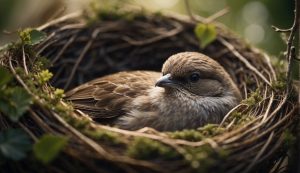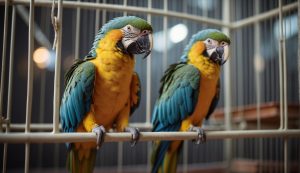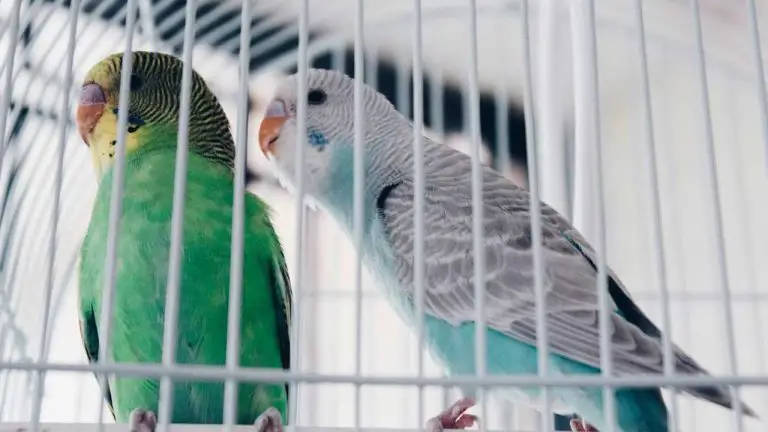Do Parakeets Lay Eggs Without a Male? Insider Knowledge on Parakeet Reproduction!
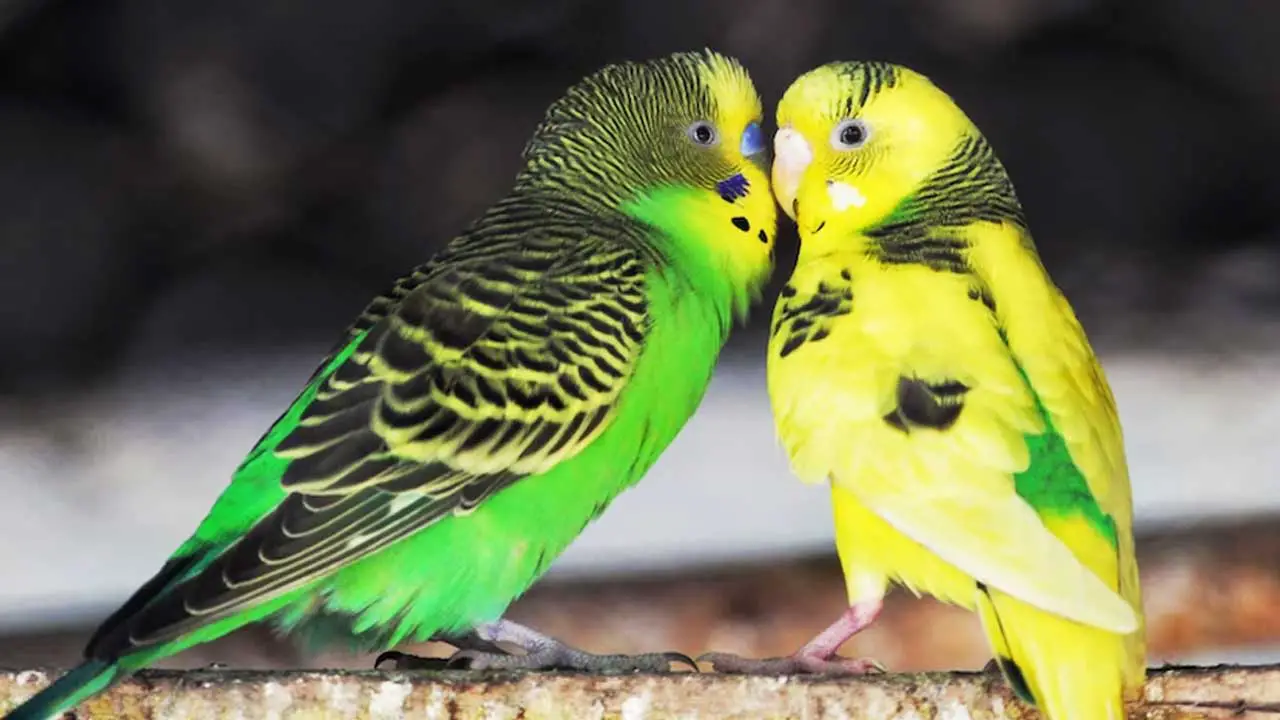
Many pet owners wonder if their female parakeets can lay eggs without the presence of a male. The answer is yes, female parakeets can lay eggs without a male. In fact, happy parakeets can lay eggs all year round as long as they’re in a stable environment and have a constantly good quality food supply provided by their owners.
If you have a solo female parakeet or multiple female parakeets without males, you may not expect eggs. But it is not uncommon for female birds to lay eggs without a male bird being present. As a pet owner, it is important to know what to do if your parakeet lays an egg, how to handle it, and whether or not it will hatch.
In this article, I will explore the topic of whether or not parakeets can lay eggs without a male and provide helpful tips for pet owners on what to do if their parakeet lays an egg. We will also discuss the process of parakeet egg-laying, how often they lay eggs, and what to do if you find an egg in your parakeet’s cage.
Table of Contents
Do Parakeets Lay Eggs Without a Male?
Yes, parakeets can lay eggs without a male present. It’s not uncommon for female parakeets to lay eggs even if they have no mate. This is because female parakeets have the ability to lay eggs without fertilization. These eggs are called unfertilized eggs and cannot hatch into baby parakeets.
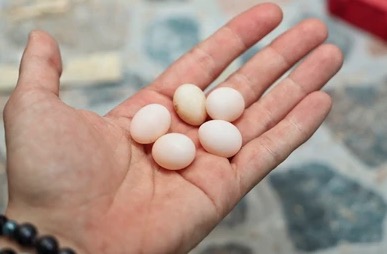
If you have a single female parakeet, it is possible for her to lay eggs. But if you have a male and female parakeet, it’s more likely that the female will lay eggs. In these cases, the male parakeet will usually fertilize the eggs, and they will have the potential to hatch into cute little baby parakeets.
If your female parakeet lays eggs without a male, it’s best to remove the eggs from the cage as soon as possible. Unfertilized eggs cannot hatch, and there’s no need to leave them in the cage. Leaving the eggs in the cage can also encourage the female parakeet to continue laying eggs, which can be taxing on her body.
It’s important to note that even if you have a male and female parakeet, it’s not guaranteed that the female will lay eggs. Factors such as age, health, and stress can all affect a parakeet’s ability to lay eggs. If your parakeet is not laying eggs, it’s best to consult with a veterinarian to ensure that there are no underlying health issues.
How Long Will a Parakeet Sit on Infertile Eggs?
Parakeets are known to lay eggs even without a male bird being present. These eggs are infertile and will not hatch into baby birds. However, the female parakeet will still sit on these eggs to keep them warm and incubate them.
The length of time that a parakeet will sit on infertile eggs can vary. On average, a parakeet will sit on her eggs for about 18 to 23 days before giving up and abandoning them. But some parakeets may continue to sit on their eggs for up to 30 days or more.
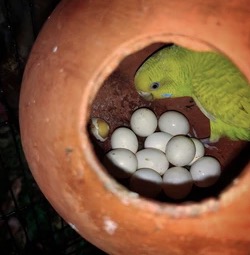
It is important to note that sitting on infertile eggs for an extended period of time can be detrimental to the health of your female parakeet. This is because she will stop eating and drinking as much while she is sitting on her eggs, which can lead to dehydration and malnutrition.
If you notice that your parakeet has been sitting on her infertile eggs for an extended period of time, it is important to intervene and remove the eggs. This will allow your parakeet to resume her normal eating and drinking habits, which will help to keep her healthy and happy.
To sum up, parakeets will sit on infertile eggs for an average of 18 to 23 days before giving up. But this can vary and some parakeets may sit on their eggs for up to 30 days or more. It is important to remove infertile eggs if your parakeet has been sitting on them for an extended period of time to prevent health issues.
Should I Remove Unfertilized Parakeet Eggs?
You might be wondering if you should remove the unfertilized eggs laid by your female parakeet. The answer to this question depends on several factors.
If the eggs have been in the nesting box for more than 21 days, it is safe to assume that they are not going to hatch. In this case, it is recommended to remove the eggs to prevent the female parakeet from becoming egg-bound.
However, if the eggs have been in the nesting box for less than 21 days, it is best to leave them alone. The female parakeet may still be incubating them, and removing them could cause her distress. Additionally, the eggs may still be fertile, and removing them prematurely could prevent them from hatching.
It is also important to note that removing eggs too frequently can cause the female parakeet to continue laying eggs to replace the ones that were removed. This can lead to health problems, including calcium deficiency and egg binding.

Bianca Says…
In my experience it’s best to leave unfertilized parakeet eggs in the nesting box until they have been there for more than 21 days. If the eggs have been there for longer than 21 days, they should be removed to prevent health problems. But if the eggs have been there for less than 21 days, it is best to leave them alone and avoid causing the female parakeet distress and to of course give the eggs a chance to hatch.
My Parakeet Stopped Sitting on Eggs – What Should I Do?
If your parakeet stopped sitting on her eggs, there could be several reasons why. Here are some things you can do to try and help her:
- Check the eggs – Make sure the eggs are still viable and not damaged. If they are damaged, remove them from the nesting box.
- Provide a comfortable environment – Make sure the nesting box is in a quiet, warm, and comfortable place. Parakeets are more likely to abandon their eggs if they feel stressed or uncomfortable.
- Provide a varied diet – Make sure your parakeet is getting a varied and nutritious diet. A lack of proper nutrition can cause a parakeet to abandon her eggs.
- Remove distractions – Make sure there are no distractions or disturbances around the nesting box. Parakeets can be easily scared away from their eggs if they feel threatened.
- Wait and observe – Sometimes, parakeets will leave their eggs for short periods of time to eat or drink. Wait and observe to see if your parakeet returns to her eggs.
If your parakeet still does not return to her eggs, it may be best to remove them from the nesting box. Remember, not all parakeets are good breeders, and it is important to be patient and understanding of your pet’s behavior.
Parakeet Reproduction
Sexual Reproduction in Parakeets
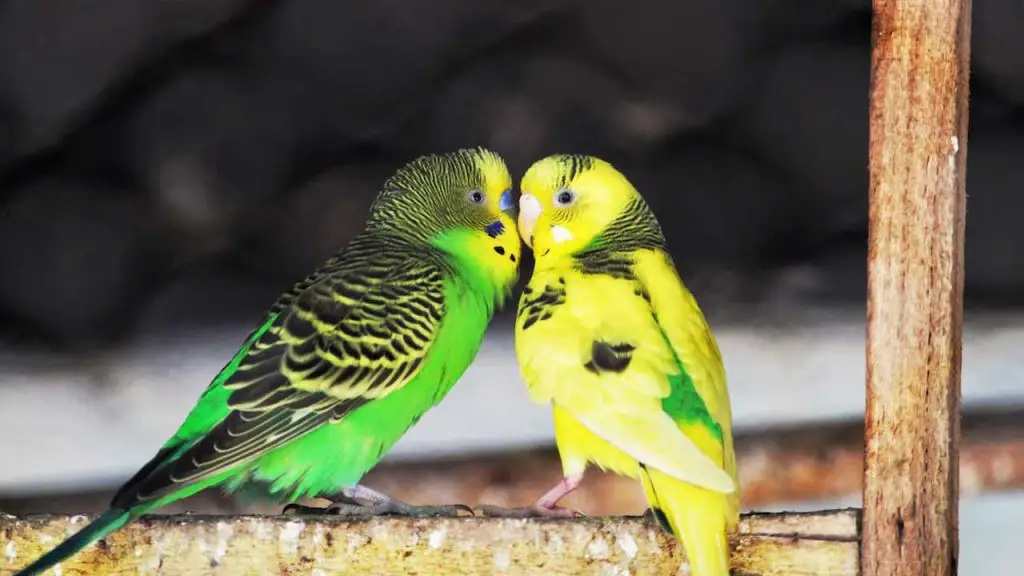
Parakeets are sexually dimorphic, meaning males and females have physical differences that can help you identify their sex. The male’s cere, the area above the beak, is usually blue, while the female’s cere is typically brown or tan.
Parakeets reproduce sexually, meaning they require a male and female to mate and produce fertile eggs. The male parakeet will court the female by singing and performing courtship displays. Once the pair has bonded, they will mate and begin the process of egg-laying.
When the female parakeet is ready to lay eggs, she will look for a suitable nesting site. Owners can provide a nesting box or other suitable materials for the female to lay her eggs. Once the eggs are laid, the female will incubate them for around 18 to 23 days until they hatch.
Asexual Reproduction
While parakeets typically reproduce sexually, it is possible for a female parakeet to lay eggs without the presence of a male. These eggs are unfertilized and will not hatch into chicks. The reasons for a female parakeet to lay unfertilized eggs can vary, but it is often due to a stable environment and constant food supply.
If you have a solo female parakeet or multiple female parakeets without males, you may not expect eggs. However, it is not uncommon for female parakeets to lay eggs even without a male present. If you notice your female parakeet laying eggs without a male, it is important to ensure she has a suitable nesting site and that she is receiving proper nutrition and care.
Bianca Says…
It’s so important to note that asexual reproduction in parakeets is not a common occurrence and should not be relied upon for breeding purposes. If you are interested in breeding parakeets, you need to have a male and female pair and to provide them with proper care and nutrition.
Factors Affecting Parakeet Egg Laying
Age
Age is one of the most significant factors affecting parakeet egg laying. A young female parakeet may not lay eggs until she is about 6 to 12 months old. On the other hand, older parakeets may lay fewer eggs, and the quality of the eggs may decrease.
It is essential to note that parakeets have a limited breeding life, and they may stop laying eggs as they age.
Diet
The diet of parakeets is another significant factor that affects their egg-laying. A diet that lacks essential nutrients such as calcium, protein, and vitamins can cause egg-laying problems.
Parakeets require a balanced diet that includes fresh fruits, vegetables, and grains. Providing your parakeets with a well-balanced diet can help prevent egg-laying problems and ensure that the eggs are healthy.
Hormonal Changes
Parakeets are very hormonal birds, and their hormones play a significant role in egg-laying. Hormonal changes can cause parakeets to lay eggs without a male.
However, hormonal changes can also cause egg-laying problems such as chronic egg-laying or egg-binding. Egg-binding occurs when the egg becomes stuck inside the female parakeet, leading to severe health problems.
It is essential to provide your parakeets with a safe and comfortable environment to reduce stress and hormonal changes.
Overall, age, diet, and hormonal changes are significant factors that affect parakeet egg-laying. Providing your parakeets with a balanced diet, a safe environment, and proper care can help prevent egg-laying problems and ensure that the eggs are healthy.
Conclusion
Parakeets are fascinating birds that can lay eggs without the presence of a male. This is due to their natural ability to produce eggs without fertilization. If you have a solo female parakeet or multiple female parakeets without males, you may not expect eggs but they can still lay them.
It is important to note that while parakeets can lay eggs without a male, it is not recommended to let them do so without proper care and attention. Owners should eliminate the eggs from the cage if there is no male to prepare them. Additionally, try not to disturb or move the parakeet when it is attempting to lay an egg.
If you are considering getting a female parakeet, it is important to be prepared for the possibility of egg-laying. Providing a stable environment and high-quality food can help minimize the risk of egg-laying complications such as egg binding.
It’s important to understand the reproductive habits of your parakeet, this will help you provide the best care possible for your feathered friend. Whether you have a male or female parakeet, make sure you provide them with a safe and comfortable environment to thrive in.
Click here to read more articles about parakeets and budgies.


